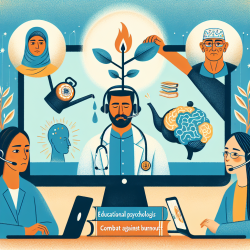Introduction
The recent study titled "Validation of the Questionnaire of Olfactory Disorders (QOD) for the Brazilian Population" offers significant insights into the evaluation of olfactory dysfunction and its impact on quality of life. This research is particularly relevant for practitioners in speech-language pathology and related fields, as it provides a validated tool that can be used to assess the quality of life in individuals with olfactory disorders in Brazil. The study highlights the importance of using data-driven tools to enhance clinical outcomes, especially in diverse populations.
Understanding the Research
The research aimed to adapt and validate the QOD for the Brazilian Portuguese-speaking population. This involved a comprehensive process of translation, back-translation, expert review, and psychometric evaluation. The study involved 126 participants from two Brazilian states, with varying degrees of olfactory loss, who completed the QOD and other quality of life assessments.
The findings revealed a high internal consistency of the QOD, with a Cronbach's alpha of 0.86 for the quality of life domain. This indicates that the QOD is a reliable tool for assessing the impact of olfactory disorders on quality of life in the Brazilian context. Additionally, the study found significant correlations between the QOD and other quality of life measures, reinforcing its validity.
Implications for Practitioners
For practitioners, the validation of the QOD provides a valuable tool for assessing olfactory dysfunction in patients. This is crucial because olfactory disorders can significantly affect a person's quality of life, leading to issues such as depression, loneliness, and reduced motivation. By using the QOD, practitioners can gain a better understanding of how olfactory disorders impact their patients' lives and tailor their interventions accordingly.
Moreover, the study emphasizes the need for culturally and linguistically appropriate tools in clinical practice. The successful adaptation of the QOD for the Brazilian population demonstrates the importance of considering cultural and linguistic factors in the development and validation of clinical assessments.
Encouraging Further Research
While the QOD provides a robust tool for assessing olfactory disorders, the study also highlights areas for further research. For instance, the sincerity domain of the QOD showed lower reliability, suggesting the need for further refinement. Practitioners and researchers are encouraged to explore these areas to enhance the tool's effectiveness and reliability.
Additionally, the study underscores the importance of cross-cultural validation of clinical tools. Researchers are encouraged to conduct similar studies in other populations to ensure that clinical assessments are applicable and reliable across diverse cultural contexts.
Conclusion
The validation of the QOD for the Brazilian population represents a significant advancement in the assessment of olfactory disorders. For practitioners, this study offers a data-driven tool that can enhance clinical practice and improve patient outcomes. By integrating the QOD into their assessments, practitioners can better understand the impact of olfactory disorders on their patients' quality of life and provide more targeted interventions.
To read the original research paper, please follow this link: Validation of the questionnaire of olfactory disorders (QOD) for the Brazilian population.










